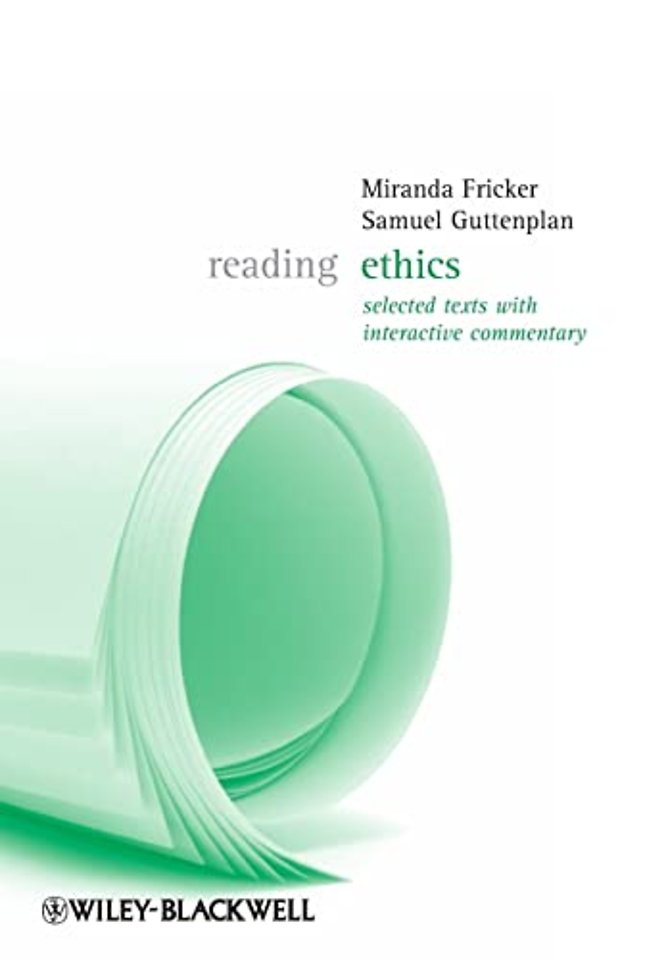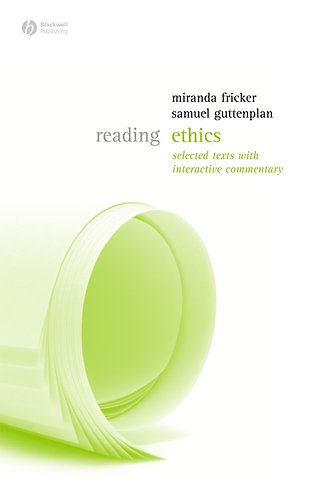Reading Ethics
Samenvatting
This text encourages students to engage with key problems and arguments in ethics through a series of classic and contemporary readings.
This text encourages students to engage with ethical issues through a series of classic and contemporary readings
Readings are accompanied by interactive commentary from the editors
Inspires students to think about the nature of moral philosophy and to draw comparisons between different traditions
Themes include: the nature of goodness, subjectivity and objectivity, justice and virtue, moral motivation, moral obligation, and literature as moral philosophy
Readings range from Plato s Republic to Rawls A Theory of Justice
Specificaties
Inhoudsopgave
<p>1. Goodness.</p>
<p>Introduction.</p>
<p>Introduction to Aristotle.</p>
<p>Aristotle, Nicomachean Ethics (extracts from Book I).</p>
<p>Commentary on Aristotle.</p>
<p>Introduction to Mill.</p>
<p>J. S. Mill, Utilitarianism (extracts from Ch. 2, What Utilitarianism Is ).</p>
<p>Commentary on Mill.</p>
<p>Introduction to Foot.</p>
<p>Philippa Foot, Utilitarianism and the Virtues (extracts).</p>
<p>Commentary on Foot.</p>
<p>2. Justice.</p>
<p>Introduction.</p>
<p>Introduction to Plato (and Socrates).</p>
<p>Plato, Republic (extracts from Books II IV).</p>
<p>Commentary on Plato.</p>
<p>Introduction to Rawls.</p>
<p>John Rawls, A Theory of Justice (extracts from Ch.1, Justice as Fairness ).</p>
<p>Commentary on Rawls.</p>
<p>3. Reasons for Action.</p>
<p>Introduction.</p>
<p>Introduction to Hume.</p>
<p>David Hume, A Treatise of Human Nature (extracts from II.III.iii, Of the Influencing Motives of the Will , and III.I.i, Moral Distinctions Not Derived from Reason ).</p>
<p>Commentary on Hume.</p>
<p>Introduction to McDowell.</p>
<p>John McDowell, Are Moral Requirements Hypothetical Imperatives? (extracts).</p>
<p>Commentary on McDowell.</p>
<p>4. Subjectivism and Objectivism.</p>
<p>Introduction to the Problem.</p>
<p>Introduction to Mackie.</p>
<p>J. L. Mackie, Ethics: Inventing Right and Wrong (extracts from Ch.1, The Subjectivity of Values .</p>
<p>Commentary on Mackie.</p>
<p>Introduction to Nagel.</p>
<p>Thomas Nagel, The View from Nowhere (extracts from Ch. VIII, Value ).</p>
<p>Commentary on Nagel.</p>
<p>5. Morality and Obligation.</p>
<p>Introduction to the Problem.</p>
<p>Introduction to Kant.</p>
<p>Immanuel Kant, Groundwork of the Metaphysics of Morals (extracts from Section II, Transition from Popular Moral Philosophy to Metaphysics of Morals ).</p>
<p>Commentary on Kant.</p>
<p>Introduction to Williams.</p>
<p>Bernard Williams, Ethics and the Limits of Philosophy (extracts from Ch. 10, Morality, the Peculiar Institution ).</p>
<p>Commentary on Williams.</p>
<p>6. Boundaries of Moral Philosophy.</p>
<p>Introduction to the Problem.</p>
<p>Introduction to Nussbaum.</p>
<p>Martha Nussbaum, Love s Knowledge: Essays on Philosophy and Literature (extracts from essay 4, Flawed Crystals: James s The Golden Bowl and Literature as Moral Philosophy ).</p>
<p>Commentary on Nussbaum.</p>
<p>Introduction to Gaita.</p>
<p>Raimond Gaita, Good and Evil: An Absolute Conception (extracts from Ch. 4, Remorse and Its Lessons ).</p>
<p>Commentary on Gaita.</p>
<p>Further Reading.</p>
<p>Index</p>

